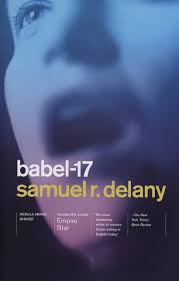 Sci-fi stories about language are automatically psi-fi, because language is so central to thought and social life. In Babel-17, Nebula award-winner Delany introduces a character with the name of Rydra Wong, a young woman who is: 1. a renown, award-winning poet, 2. a linguist and ethnographer of the first order, 3. a cryptographer, and oh, yes, 4. a starship captain. Needless to say, such a fantastical superhero is not a character that invites empathic reader engagement. None of the characters do.
Sci-fi stories about language are automatically psi-fi, because language is so central to thought and social life. In Babel-17, Nebula award-winner Delany introduces a character with the name of Rydra Wong, a young woman who is: 1. a renown, award-winning poet, 2. a linguist and ethnographer of the first order, 3. a cryptographer, and oh, yes, 4. a starship captain. Needless to say, such a fantastical superhero is not a character that invites empathic reader engagement. None of the characters do.
The cold war leaks into the novel, as it did into so many of the 1960’s. Military intelligence turns to Wong to crack a message their staff cryptographers cannot decipher and after cursory examination she pronounces that it is not a message, but a language. What? A message is actually a language? Those are incommensurable concepts. What their equation could possibly mean is anybody’s guess, but that’s her report, right or wrong.
The alien language, she discovers, is constructed in a way (not described) that allows expression of ideas that cannot be spoken in other known languages, and therefore, following the ever-popular Sapir-Whorf hypothesis, cannot even be thought. Except by her, of course.
This super language allows conceptualization of deep, instinctual thoughts (not specified), and also enables mental telepathy, precognition, and clairvoyance, which are very handy skills.
One might say that human brains evolved to accommodate human language, not any possible language in the universe, but that’s not a problem if you’re a computational linguist like Noam Chomsky. Apparently, Wong is, thought that is never mentioned and this book does not go that far into what language is, or is about. It’s really just a lot of hand-waving about language, which was a disappointment to me.
With her newfound super-language skills, Wong has no trouble defeating the enemy in two, or was it three, long, drawn-out starship battles. Luckily, the aliens used that very language which only she, among the good guys, understands. Who would have seen that coming?
The novel has been criticized for being sketchy, with ideas and characters only hinted at, and that is true. Yet I still think it was too long. I nearly fell asleep during the long space battles, which I found incredibly boring, explosions notwithstanding (I also found Star Wars boring, so make your assessment of my outlook from that). All that space-opera stuff is just World War II with spaceships. In 1966 that might have been pretty dazzling. Today, it still seems to play to a crowd. I don’t know why.
Near the end, a linguistic gimmick is introduced by which the new language, with ambiguity around first-person pronouns like “I” and “You,” allows or causes some kind of mind-melding thing which I didn’t quite understand. It’s not a bad idea, but as others have noted, it’s just sketched, not really explored.
I’m afraid I didn’t I didn’t get any new ideas about language from this book, which was my hope. Delany never did specify how language and thought are related or even how language and communication depend on each other. The adventure part of the story left me cold. So it wasn’t a favorite.
However, I give it psi-fi points just for having the audacity to explore language in the dark ages of 1966. Some similarities between Babel-17 and Mieville’s Embassytown are apparent. There’s no doubt that Delany’s book has been influential.
Delany, Samuel R. (1966/2001). Babel-17. New York: Vintage, 219 pp. Published as a double novel with Empire Star.